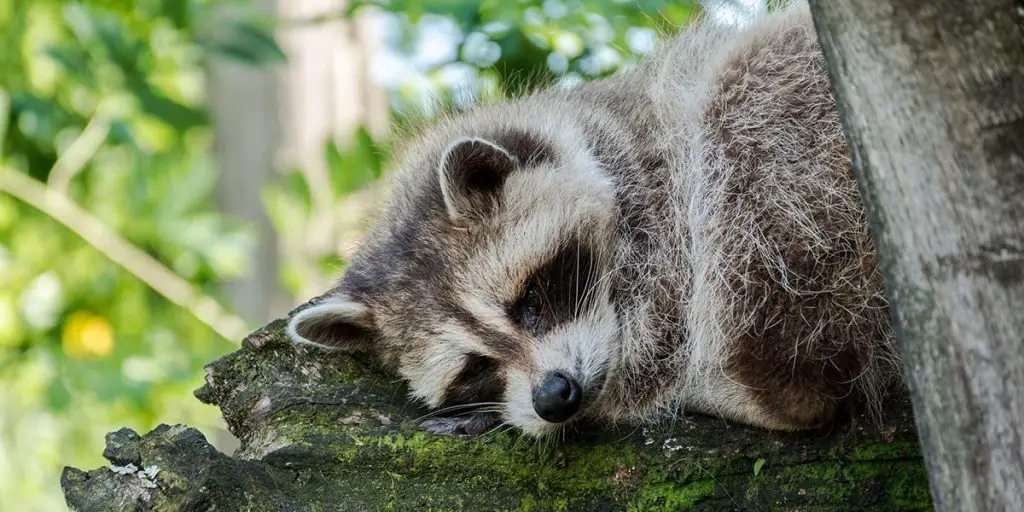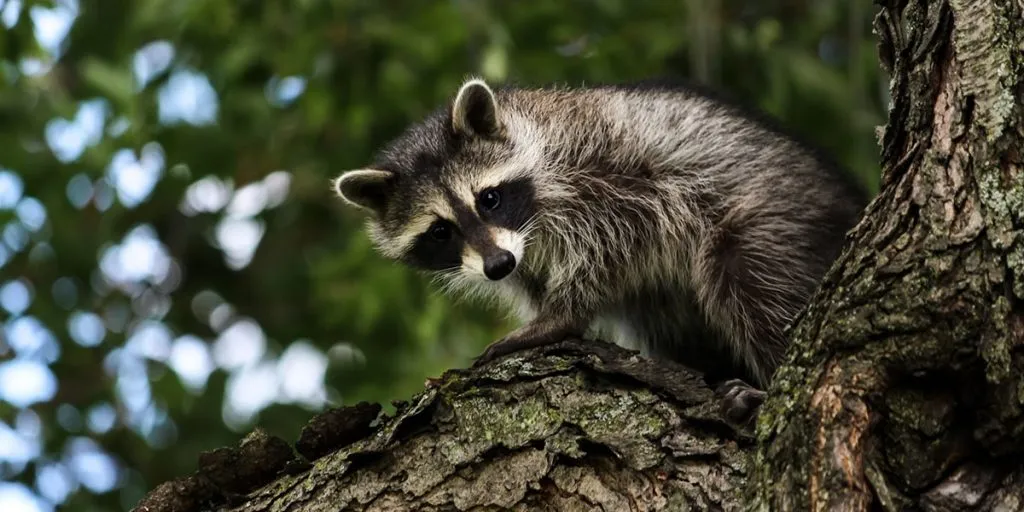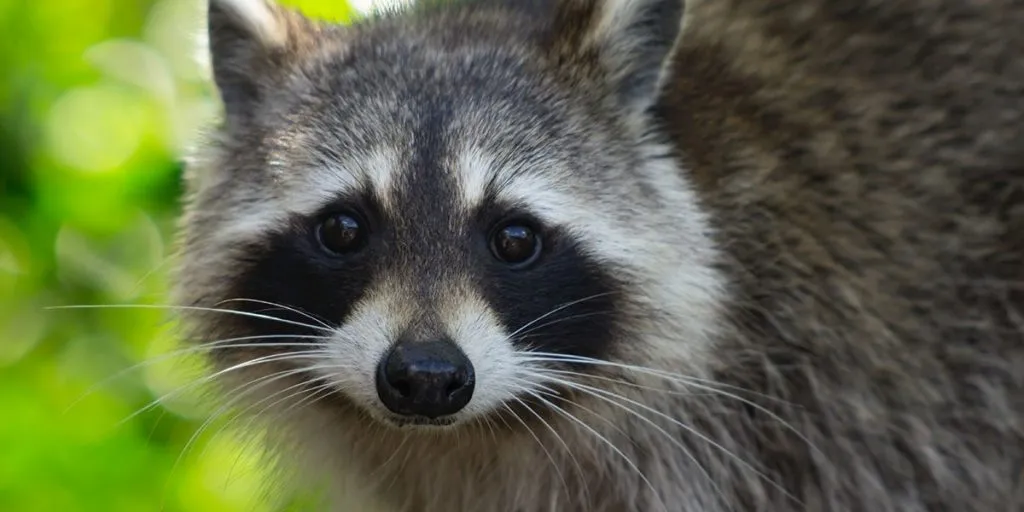Where you will once find a sleeping raccoon, you will rarely ever find it there again. The only exceptions are their month-long winter sleep, and the nesting period of baby raccoons.
The nocturnal animals typically rest during the daytime, hiding in one of their many dens:
- Tree hollows
- Rock cavities
- Fox or badger burrows
- Attics or chimneys
- Sheds
- Porch decks
- Abandoned vehicles
- And many more hiding spots…
A sleeping raccoon will generally relocate when food sources are depleted, or when a predator is nearby. This can make it difficult to catch and stop them, especially because they use the darkness of night to make their escape.
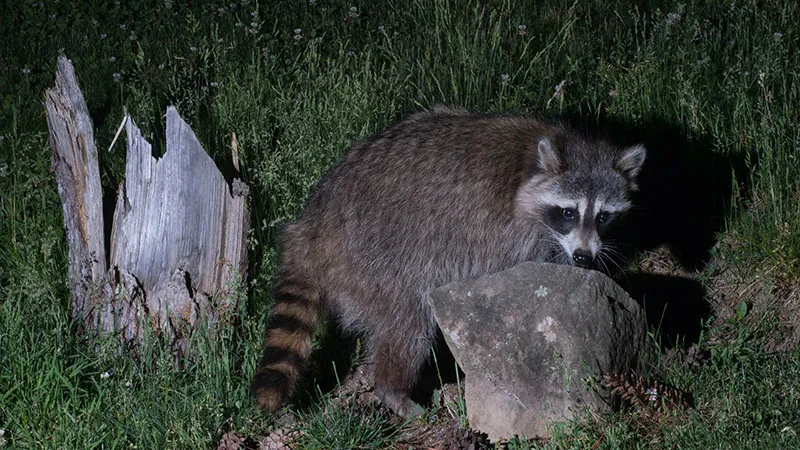
How Do Raccoons Sleep?
In general, raccoons sleep anywhere they want. A raccoon will most commonly sleep in a tree hollow, but they are also notorious for making holes in the weaker parts of roof structures. The animals can be found in sheds, vehicles, under decks, in chimneys, and in crawl spaces or attics.
Raccoons sleep during the daytime, as they are adapted to be most active during the night. They generally keep warm by crawling up into a bundle and positioning their bodies tucked in their tail fur, similar to what a cat would do.
It is not uncommon for a raccoon to change where it lives almost every night. However, all their hiding spots give plenty of shelter to the animal. A raccoon won’t be found sleeping exposed in an open field. It will always hide away from predators or other unwanted intruders (such as humans).
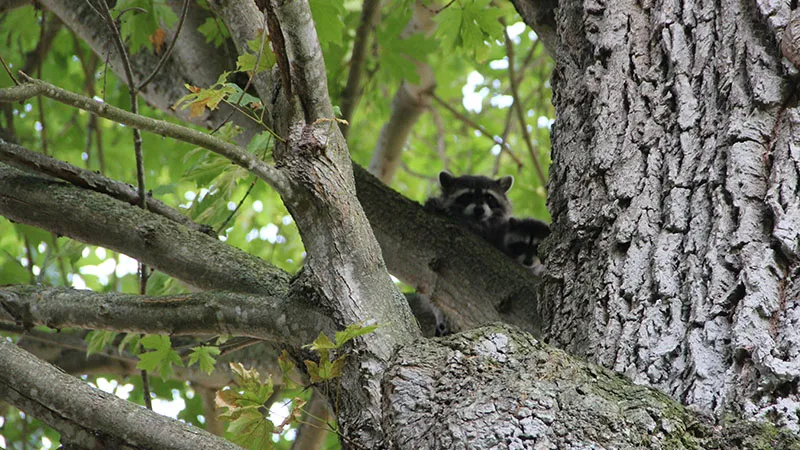
The Sleeping Raccoon: Busting 5 Myths
There is a lot of misguided information floating around the internet regarding sleeping raccoons. We collected a bunch of the most persistent myths and will debunk them for you below:
- They don’t sleep with their eyes open: While the infamous trash panda might have a lot of predators, they haven’t developed the capability to sleep while having their eyes opened. Unlike mammals such as dolphins, who need to stay half-awake to survive, the raccoon has a different strategy. It chooses to hide so well, that other dangerous animals can’t even reach or detect them.
- Raccoons need shelter, they don’t sleep in the open: It pays to be lazy, because the raccoon hides to defend itself. Sleeping out in the open would be a death sentence for a trash panda. After all, there are plenty of predators that might want to kill them. If there’s one thing you can be sure of, is that you’ll never find a raccoon sleeping out in a field.
- Sleeping on the ground doesn’t happen a lot: Expanding on the previous myth, you’ll only ever see a raccoon sleeping on the ground when it has the ability to physically hide from the outside world. Think about hiding under a patio deck, in vents, crawl spaces, or perhaps even a tree stump. They prefer to choose the high ground to make a nest, though.
- Raccoons won’t sleep upside down: Not sure where this idea came from, but a raccoon is not a bat. And it doesn’t live in Australia either. The animals are happy to sleep in strange positions, but upside-down sleeping won’t be comfortable for a raccoon. This is because all their blood would flow to their head, which puts a lot of internal pressure on this vital part of their body.
- They don’t hibernate in winter: Unlike popular belief, a raccoon will never do a complete winter sleep. Instead, their strategy to preserve energy in the cold months is to sleep for short intervals of several weeks. This is called ‘torpor‘, and is not true hibernation. You will find fewer raccoons in wintertime, but they will still be active.
Do Raccoons Sleep Alone Or Together?
Raccoons are territorial animals, therefore they commonly live and sleep alone. Raccoons will also live and sleep together in small family groups, usually a male and female together during mating season, or a mother and her offspring (up until 8-9 weeks old).
If anything, it shows the extreme versatility and adaptability of this animal. While it thrives best on its own, it can also adapt to stay together. Raccoons are highly social and opportunistic creatures. They will happily adapt to the situation, and do so a lot faster than most other animals.
Behavioral Exceptions Always Exist
As with most things in nature, there are always exceptions to the rule. Sometimes you will find multiple individuals sleeping together for other reasons. For example, two babies left the nest together and live as brothers and/or sisters in a single nest.
Individuals might linger around together due to a lack of dens and an abundance of food (usually in urban settings). A lot of things can change in their behavior if it might improve their chance of survival.
In zoos or as pets, they are even more likely to sleep together as they are taken out of their natural environment. However, it is common to find solitary animals in a natural setting. Especially the males, since they won’t take part in raising their babies.
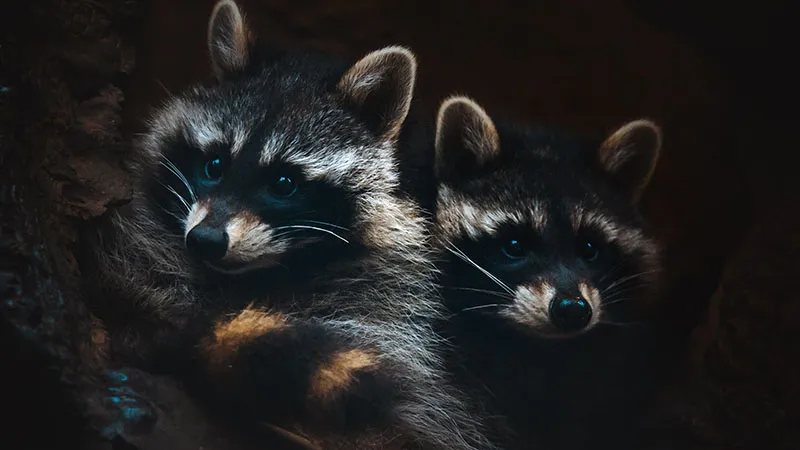
Sleeping Raccoons Have Many Hiding Spots
We love raccoons for their ability to adapt to the situation. They aren’t picky about where they sleep, how they sleep, and with whom they sleep. As long as it helps them get food, protection, and warmth, they are happy to cooperate.
In urban, semi-natural environments, the raccoon can usually be found near homes. This is especially true in winter, when the heat of the roof attracts the animals naturally.
Food is a deciding factor in where a raccoon might hide during the day. Their den can be made of bricks, wood, or even a trash bin. As long as the animals have access to a food source nearby, they are happy to sleep on your porch or in your chimney.
So if you want to get rid of raccoons efficiently, don’t do so by finding their nests, but remove access to their food sources. Otherwise, you’ll have a high chance of being outsmarted by a trash panda. Good luck on your search, and remember to humanely remove raccoons from your property where possible.

